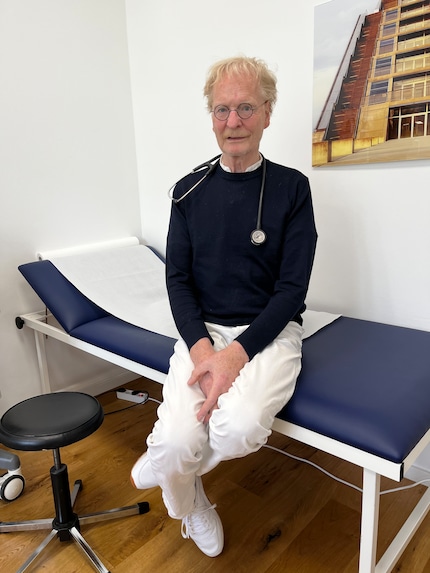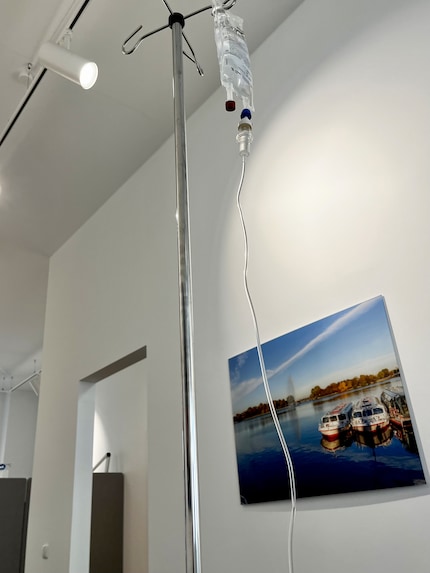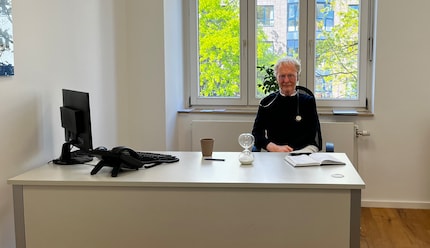
Background information
The perfect pet? Here’s what it’s like to have pet rats
by Michael Restin

I meet Professor Andreas Raedler to talk about chronic inflammatory bowel disease. We conduct an interview without technical jargon, but with plenty of personality and sensitivity.
Professor Andreas Raedler seems to be characterised by humility and discretion. He speaks in a soft voice, so soft that I have to bring my recorder very close to him. The doctor I'm meeting for this interview is considered a leading expert in the field of chronic inflammatory bowel disease, or IBD. Patients from all over Germany, and even abroad, flock to his practice in Hamburg in the hope that "the prof", as they call him, will help them find a cure.as they call him, will finally enable them to regain a certain quality of life, without 20 bouts of diarrhoea a day, without painful spasms, without extreme fatigue.
This interview is also an attempt to lift taboos. In Germany, according to the German Crohn's and Ulcerative Colitis Association, around 400,000 people have IBD, and in Switzerland, according to University Hospital Zurich, 25,000 people are affected. Crohn's disease and ulcerative colitis are therefore among the fairly common diseases of the gastrointestinal system. But have you ever heard someone say, "I've had bloody diarrhoea for weeks and sometimes I shit myself because I can't get to the toilet in time"? No, right?
Professor Raedler, at present, what does science say about the origin of IBD?
Prof. Raedler: Crohn's disease and ulcerative colitis are diseases linked to the Western lifestyle, as they are called. They first appeared in the United States around a hundred years ago and spread around the planet like Coca-Cola and McDonald's, starting with North America, Central and Northern Europe, plus Japan, Australia and Israel. They then conquered the rest of the world. That's the first thing. The second is that IBD symptoms are necessarily linked to diet. When patients are fed artificially, i.e. by vein, the disease suddenly stops. If they start eating again, it starts all over again. This indicates that the disease is caused by substances present in the diet.
But we all eat, why do only some people suffer from IBD?
There are thousands of hypotheses, but the right answer has yet to be found. For me, the most plausible explanation is that it is a disorder of the immune system, the predisposition to which is at least partly hereditary. To understand the historical context, I need to digress for a moment. Are you afraid of aliens?
Etraterrestrials?
Our immune system is perfectly adapted to conditions on Earth. It recognises viruses, bacteria as well as fungi and triggers an appropriate and intelligent defence reaction. If an extraterrestrial landed right now and shook your hand, you would probably catch some intergalactic disease and your immune system would go into overdrive. Something similar happened 150 years ago in the United States, when the food industry started producing complex molecules and processing them. A healthy intestine simply allows flavour enhancers or preservatives to pass through. In IBD patients, the immune system probably mistakes these substances for dangerous bacteria or viruses and wants to eliminate them as quickly as possible. The immune system therefore sounds the alarm and triggers diarrhoea to expel the presumed intruder. At the same time, it signals to the body, "We're at interstellar war, all immune cells to battle stations!", causing inflammation of the intestinal mucosa.

Beyond diarrhoea, what other symptoms are caused by inflammatory bowel disease?
Diarrhoea is the main symptom. Patients have to go to the toilet 20 to 30 times a day. Diarrhoea is often bloody, as the inflamed intestinal mucosa is very fragile and undergoes mechanical stress during diarrhoea. It's absolutely frightening for patients. Suddenly, the water in the toilet turns bright red. What's more, those affected experience violent cramps which, in extreme cases, can only be tolerated with opiates. Added to this is an often extreme fatigue.
Can organs other than the intestine be affected?
Yes, for example the liver, eyes, joints or skin. Of course, 80% of the immune system is in the intestine, but in principle, all the organs are under the surveillance of the immune system and can become inflamed.
This sounds a lot more serious than a simple gastroenteritis, which you get over in a few days.
In fact, these illnesses are particularly hard on patients psychologically. Acute attacks can last several weeks or months. Nor is the onset of IBD a slow process for those affected. It comes as a surprise. It's a turning point in their lives. If you have diarrhoea 20 times a day, your normal life is over. People no longer dare to leave their homes and are already happy if they get to the toilet on time when they're at home. For most patients, the onset of the disease occurs in their twenties or thirties, sometimes even earlier, precisely at the time when young people want to enjoy life and find their place in society. With school, university and travel behind them, personal and professional ambitions seem a long way off.
How do those affected deal with the disease mentally?
In very different ways. Some are even relieved, because they finally know what's wrong. Others find themselves at the bottom of the hole. Most of them have already been through a long medical marathon before their IBD was diagnosed. This is because the usual family doctors don't know much about it and start by looking for infections. This, of course, prolongs the ordeal. It can take months before patients find their way to a gastroenterologist who specialises in IBD.
How is the diagnosis made? Are there any blood test results characteristic of IBD?
There is a marker of inflammation in the stool, called calprotectin, which is much higher in patients with acute IBD than in healthy people. This can be determined in the laboratory. In addition, a gastrointestinal endoscopy can confirm the diagnosis if it reveals the presence of inflamed tissue.
The term IBD encompasses two diseases: Crohn's disease and ulcerative colitis. What exactly is the difference - or is the distinction not so important after all?
In Crohn's disease, the inflammation extends deep into the skin layers of the intestine. Crohn's disease can literally tear holes in the tissue. In the case of colitis, the inflammation is more superficial and mainly affects the mucosa. This does not make the symptoms any less distressing. That's why the treatment is similar.
What is the treatment? Can Crohn's disease or ulcerative colitis be controlled so that patients no longer experience symptoms and can continue to lead their previous lives?
I dare say that all those affected can make a full recovery. But for that to happen, you need a lot of patience, the right medication and an understanding that IBD is a global pathology and should be treated as such.
At this point in my conversation with the professor, his phone rings: "I need to take this call, if you don't mind," I nod. While he's on the phone, I look around the consulting room. It's rather spartan. In one corner is the essential examination table with an ultrasound machine next to it. An imposing white shelf stands against the wall. It is virtually empty. Only three stacks of information leaflets are on it: colonoscopy, gastroscopy and both together.
"I expected to see more books," I say to Professor Raedler once he has hung up.
Oh, you should see my library at home. There are about 20,000 books. I've even fallen behind because I've already ordered new ones and don't have time to read.
Most knowledge is in your head anyway, I feel.
Stop it! Your compliments embarrass me. Where were we before the phone rang?
The treatment of ulcerative colitis and Crohn's disease.
Yes, that's right... Because bloody diarrhoea is the worst for patients, that's where treatment comes in. Not only must the inflammation be treated, but the intestine must also be put to rest. The diarrhoea can often be treated with harmless medicines available from any pharmacy. Then I can tell patients: "Tomorrow, things will be much better and you'll probably only have five bouts of diarrhoea instead of twenty". Controlling inflammation is much more difficult. In the case of mild inflammation, mesalazine-based medicines in tablet or suppository form are sufficient. In severe cases, or those that are difficult to control, it is often necessary to resort to so-called biologics, such as infliximab or vedolizumab. These are antibodies produced by genetic engineering and administered to patients by infusion or injection. Depending on the drug, treatment must be repeated every four to eight weeks. This means that those affected become regulars at the gastroenterology practice.

It seems to be very disabling and there is no miracle cure for IBD yet. Isn't that right?
What's complicated is that each patient's care needs to be personalised. The time at which drug treatment takes effect varies: rarely is a few days enough, and often it takes several weeks. Some patients also suffer side effects such as fatigue, joint pain or allergic reactions. I also have to react to these phenomena. As a doctor, I also have to check inflammation markers in the blood and faeces at intervals of several weeks and decide whether the current treatment is appropriate or whether I need to change the dosage or even the drug. Experience has taught me a lot, but sometimes you can only try. The treatment doesn't stop there though.
No?
At the same time, patients need to pay attention to their diet. In a study with twins, I discovered that, despite identical genes, in 50% of cases only one of the twins has the disease. The difference lies in the person's life history: how did they eat? Did they suffer a lot of stress? Have they taken a lot of antibiotics or certain painkillers in the past? What's more, an imbalance in the bacterial flora in the intestine is always partly responsible for the onset of IBD. That's why the rule to follow is: few carbohydrates, little sugar. And listen to your gut. If something doesn't suit you, stop eating it. In addition, good stress management is important.
Is there a specific stress management for these diseases?
Anything that calms our abdominal brain and activates the parasympathetic system, which promotes relaxation, is useful, for example yoga or meditation. Tension, anxiety or stress agitate our abdominal brain, which represents the autonomic nervous system. This can cause pain and diarrhoea. Sometimes psychotherapy can also help patients by supporting them in their daily lives and helping them to change harmful attitudes. The HeartMath method is completely new. It involves watching your heart rate. When you're stressed, your rhythm is rather irregular; when you're relaxed, it's in harmony. Using a small measuring device, patients can track their heart and get a better idea of what is or isn't stressing them.
How many patients do you follow in your practice in Hamburg?
I don't know exactly. I also run an online forum on a voluntary basis. Around 5,000 IBD sufferers are registered on ced-hospital.de and can ask me questions about their diagnosis or treatment. Every day, I answer around forty messages, sometimes staying on the line for four hours. I don't receive a penny from the health insurance funds for this activity. What matters to me is improving care for people who are ill. People who write to me generally receive a reply within 24 hours. I even have a patient from New York whom I advise.
If you've achieved so much as a doctor, why do compliments make you uncomfortable?
It's simply against my nature.

Here it comes again, his modesty. Professor Raedler's office is just as minimalist. His only personal item: his iPhone. A photo of his daughter is printed on the shell. "Professor Raedler must be over 70, if I'm interpreting his CV correctly. He studied medicine in Hamburg from 1968 to 1975, culminating in a doctorate awarded summa cum laude.
Do you ever think about stopping? You could have retired long ago.
Of course, I'll have to stop one day. But until then, I still have plans. I want to move my practice to a medical centre soon. I'll finally be able to do colonoscopies myself. Here, it's not possible because of the premises, I always have to send my patients to colleagues.
With IBD, we still don't know how to cure it. There are no vaccines either. Even in the remission phase, people who have already suffered from the disease remain predisposed to a new attack. Professor Andreas Raedler seems to me to be just as remarkable a phenomenon as chronic inflammatory bowel disease. Where this man gets his energy from, I don't know. I just have the impression that IBD has found a worthy adversary in him.
Headline photo: Anika Schulz
As a child, I was socialised with Mario Kart on SNES before ending up in journalism after graduating from high school. As a team leader at Galaxus, I'm responsible for news. I'm also a trekkie and an engineer.
Interesting facts about products, behind-the-scenes looks at manufacturers and deep-dives on interesting people.
Show all